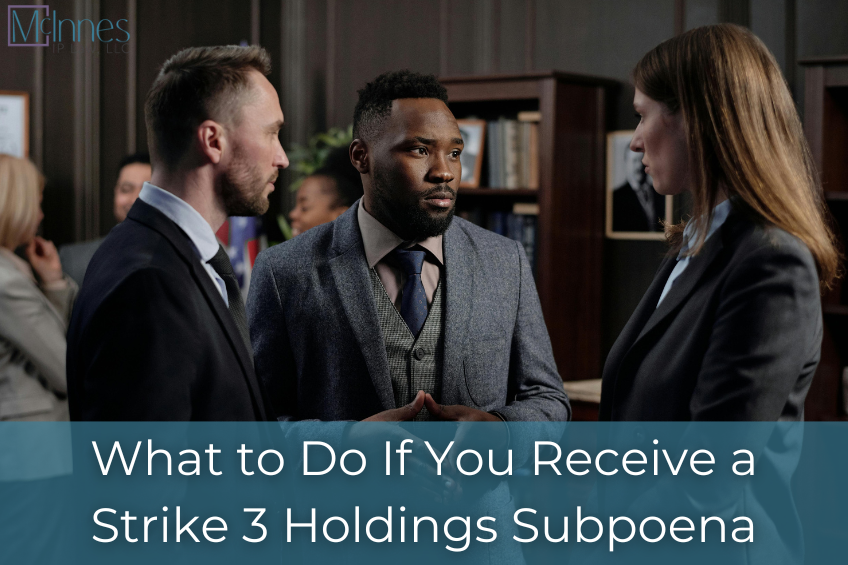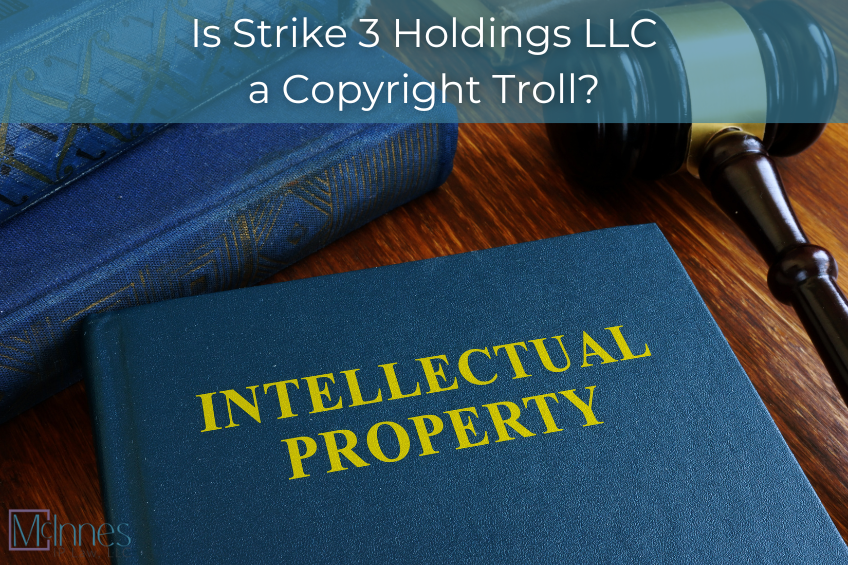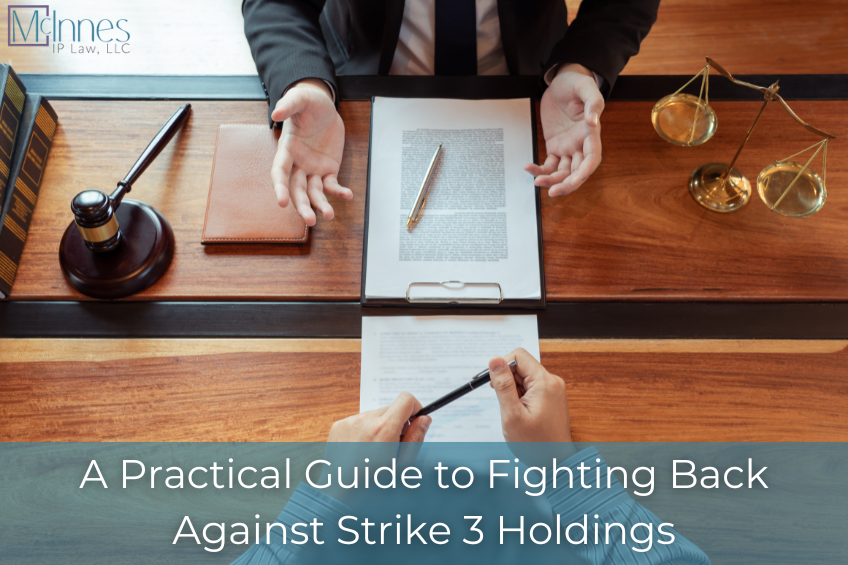Receiving a Strike 3 Holdings subpoena can be an unsettling experience. The company, known for aggressively pursuing alleged copyright infringement cases, has built a reputation as a copyright troll. Strike 3 files mass lawsuits to pressure individuals into quick settlements rather than proving actual infringement in court. Strike 3 primarily targets individuals accused of torrenting copyrighted content, using subpoenas to demand payment under the threat of costly litigation.
These lawsuits often rely on tracking Internet Protocol (“IP”) addresses, which don’t always identify the actual person responsible for the alleged infringement. Many individuals targeted by Strike 3 are unaware of any wrongdoing, yet they face intimidating legal notices demanding many thousands of dollars in damages.
If you’ve received a Strike 3 Holdings subpoena, understanding your rights and legal options is crucial. Taking the right steps early on can help you avoid unnecessary legal costs, protect your privacy, and, in many cases, get the claim dismissed or settled discreetly.
What We’ll Cover:
- What does a Strike 3 Holdings claim look like?
- What are 6 defenses to a Strike 3 claim?
- Key takeaways
- Legal representation for a Strike 3 Holdings subpoena
What Does a Strike 3 Holdings Claim Look Like?
If you’ve received an Internet Service Provider (“ISP”) letter notifying you of a Strike 3 Holdings lawsuit, you’re likely wondering what it means and how the process works. Understanding how Strike 3 operates is the first step in determining your legal options.
How Does Strike 3 File Its Lawsuits?
-
- Tracking IP Addresses – Strike 3 Holdings uses BitTorrent monitoring software to track IP addresses that allegedly download or share copyrighted content.
- Filing a “John Doe” Lawsuit – Because they don’t initially know the identity of the individual, Strike 3 sues an unnamed defendant (e.g., “John Doe”) and requests a subpoena from the court.
- Issuing an ISP Subpoena – The court grants Strike 3 permission to subpoena internet service providers like Verizon, Comcast, or Spectrum to obtain the subscriber’s identity.
- Sending an ISP Letter – The ISP letter is your first notification that Strike 3 has filed a lawsuit and is requesting your personal information. Many people discount these letters as spam as they can often be delivered via email and may even end up in your Junk Mail folder. DO NOT ignore these letters.
What Happens After You Receive an ISP Letter?
- You have a limited time to respond before your ISP is legally required to disclose your identity.
- Strike 3’s lawyers may contact you with a settlement demand, often for thousands of dollars.
- If you ignore the letter, your identity may be revealed, and Strike 3 could amend the lawsuit to name you directly, increasing legal risks and the likelihood that someone could associate your name with the lawsuit, potentially jeopardizing your reputation and your employment due to the nature of the lawsuit.
- If you respond strategically, you may be able to negotiate a lower settlement or fight the claim entirely.
Do You Need Legal Representation Against Strike 3 Holdings?
6 Defenses to a Strike 3 Claim of Copyright Infringement
If you’ve been targeted in a Strike 3 Holdings lawsuit, you may have several legal defenses depending on your situation. These cases often rely on assumptions rather than direct proof, which means there are multiple ways to challenge their claims. Below are some of the most common defenses that may apply.
1) Misidentification of Defendant
Strike 3 Holdings bases its lawsuits on IP addresses, but an IP address does not confirm the identity of the person who allegedly downloaded the copyrighted content. Several scenarios could lead to a mistaken lawsuit, including:
- A roommate, guest, or neighbor using your internet connection.
- A hacked or unsecured Wi-Fi network that was accessed without your knowledge.
- A dynamic IP address assigned by your ISP that changed before or after the alleged infringement occurred.
Since Strike 3 must prove that the actual defendant was infringed, not just that their IP address was involved—this defense can be effective in challenging their case.
2) Insufficient Evidence
Strike 3’s lawsuits rely on BitTorrent tracking software to identify IP addresses allegedly involved in copyright infringement. However, this software is not foolproof. Courts have questioned whether the data collected is reliable enough to prove that an individual downloaded or shared content.
To succeed in their claim, Strike 3 must demonstrate that:
- The defendant actively participated in downloading or sharing copyrighted content.
- The evidence collected is accurate, unaltered, and legally obtained.
If their evidence is weak, inconsistent, or based on flawed software, the case may lack the necessary proof to move forward.
3) No Intent or Knowledge
Copyright infringement cases often involve the issue of intent. If you were unaware of the alleged infringement, it may be harder for Strike 3 to argue that you acted willfully. Common examples include:
- A compromised device infected with malware or unauthorized software.
- An open Wi-Fi network that an unknown party accessed.
- A misunderstanding of how peer-to-peer file-sharing software works.
Since willful infringement can impact the damages awarded in a case, proving a lack of intent may reduce liability.
4) Fair Use Doctrine
Although difficult to apply in these cases, fair use may be a defense if:
- The material was used for criticism, commentary, research, or education rather than for personal entertainment.
- The copied portion was minimal and not central to the work’s value.
- The use did not negatively affect Strike 3 Holdings’ ability to profit from its content.
While courts rarely grant fair use protections in torrenting lawsuits, it remains a potential argument in certain cases.
5) Copyright Misuse or Abuse of the Legal System
Some courts have recognized that Strike 3 Holdings engages in aggressive litigation tactics that prioritize settlements over actual copyright enforcement. If their approach is seen as abusive, it may be possible to argue that:
- Strike 3 is using lawsuits as a profit-making strategy rather than for legitimate copyright protection.
- The case is meant to pressure defendants into settlements rather than proving infringement in court.
- The legal action is a form of harassment that unfairly targets individuals without sufficient evidence.
If a court agrees that Strike 3’s tactics are abusive, the lawsuit could be dismissed, or the company could face sanctions.
6) Statute of Limitations
Copyright infringement lawsuits are subject to a three-year statute of limitations. If Strike 3 files a lawsuit more than three years after the alleged infringement, the case may be dismissed on procedural grounds.
Key Takeaways
If you’ve received a Strike 3 Holdings subpoena, it’s important to remember that you have options. These cases are often built on weak evidence and intimidation tactics designed to force quick settlements. Understanding your rights can help you avoid costly mistakes.
- A subpoena from your ISP does not mean you are guilty. Strike 3 must prove that you personally committed copyright infringement.
- Ignoring the lawsuit can make things worse. If you do nothing, your ISP may disclose your identity, increasing your legal risks.
- You may have strong defenses. Many Strike 3 cases rely on assumptions rather than concrete evidence, and factors like misidentification, lack of intent, or insufficient proof can weaken their claim.
- Quick action can help protect your privacy. If you respond strategically, you may be able to settle discreetly or challenge the lawsuit before it escalates.
- An experienced lawyer can make a difference. A Strike 3 lawyer can assess your situation, explain your options, and help you resolve the case in the best possible way.
Need Help? Contact McInnes IP Law Today
If you’ve received a Strike 3 Holdings subpoena, acting quickly is essential. These lawsuits can be intimidating, but you don’t have to navigate them alone. At McInnes IP Law, we specialize in negotiating settlements for these torrenting or Strike 3 lawsuits and intellectual property disputes, offering discreet, strategic legal defense to protect your rights and financial well-being.
Our experienced team can help you:
- Assess your legal options and potential defenses.
- Negotiate a fair settlement, if necessary, to minimize costs.
- Protect your privacy and prevent unnecessary legal exposure.
- Fight back against weak or baseless claims.
Time is critical in these cases, so don’t wait. Contact us today for a free, confidential consultation and take control of your defense. Call 774-234-1256 or email info@mcinnesiplaw.com.
Disclaimer: This blog is for informational purposes only and does not constitute legal advice. Every case is different. For specific guidance, consult an attorney experienced in copyright law.



